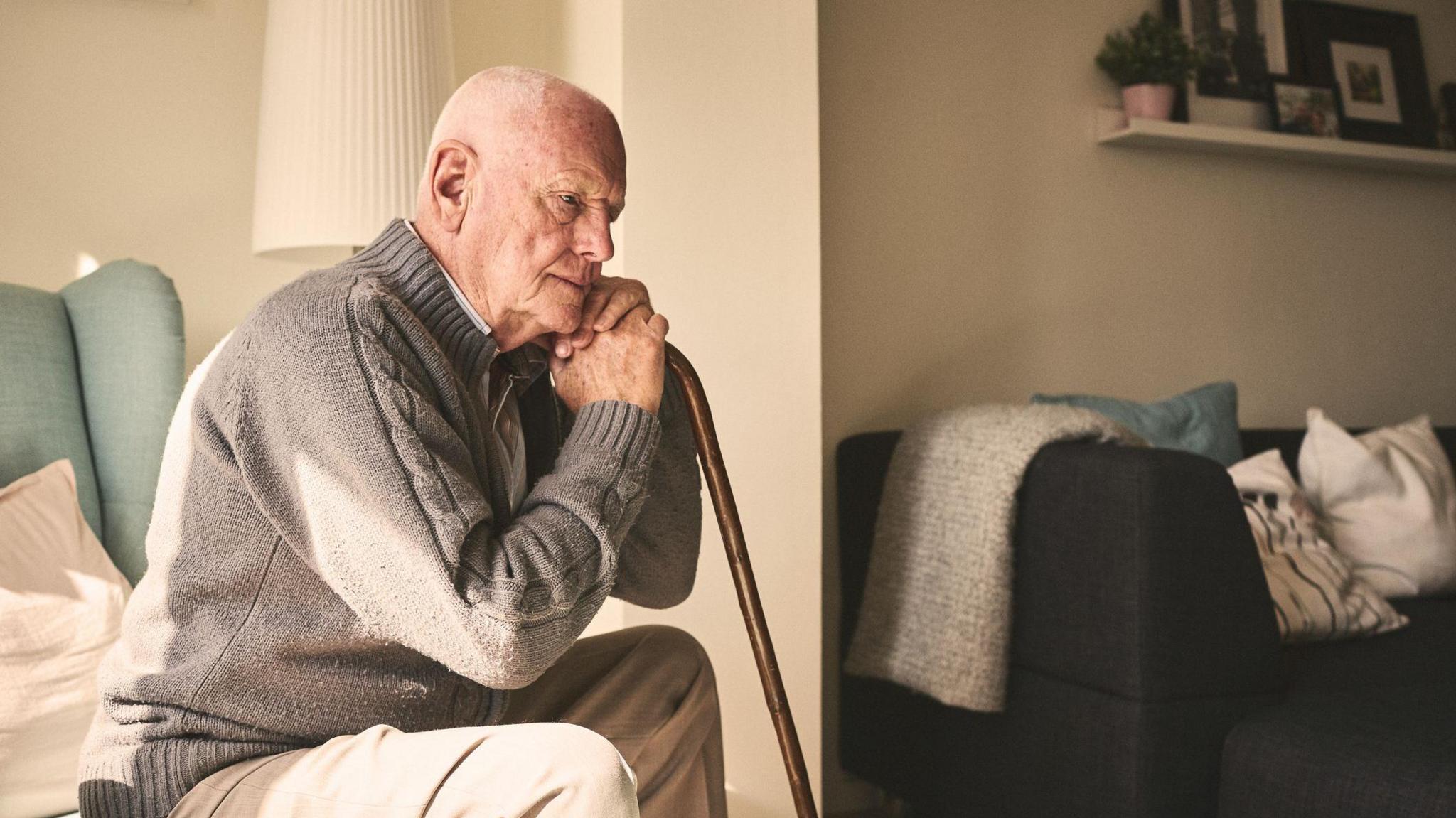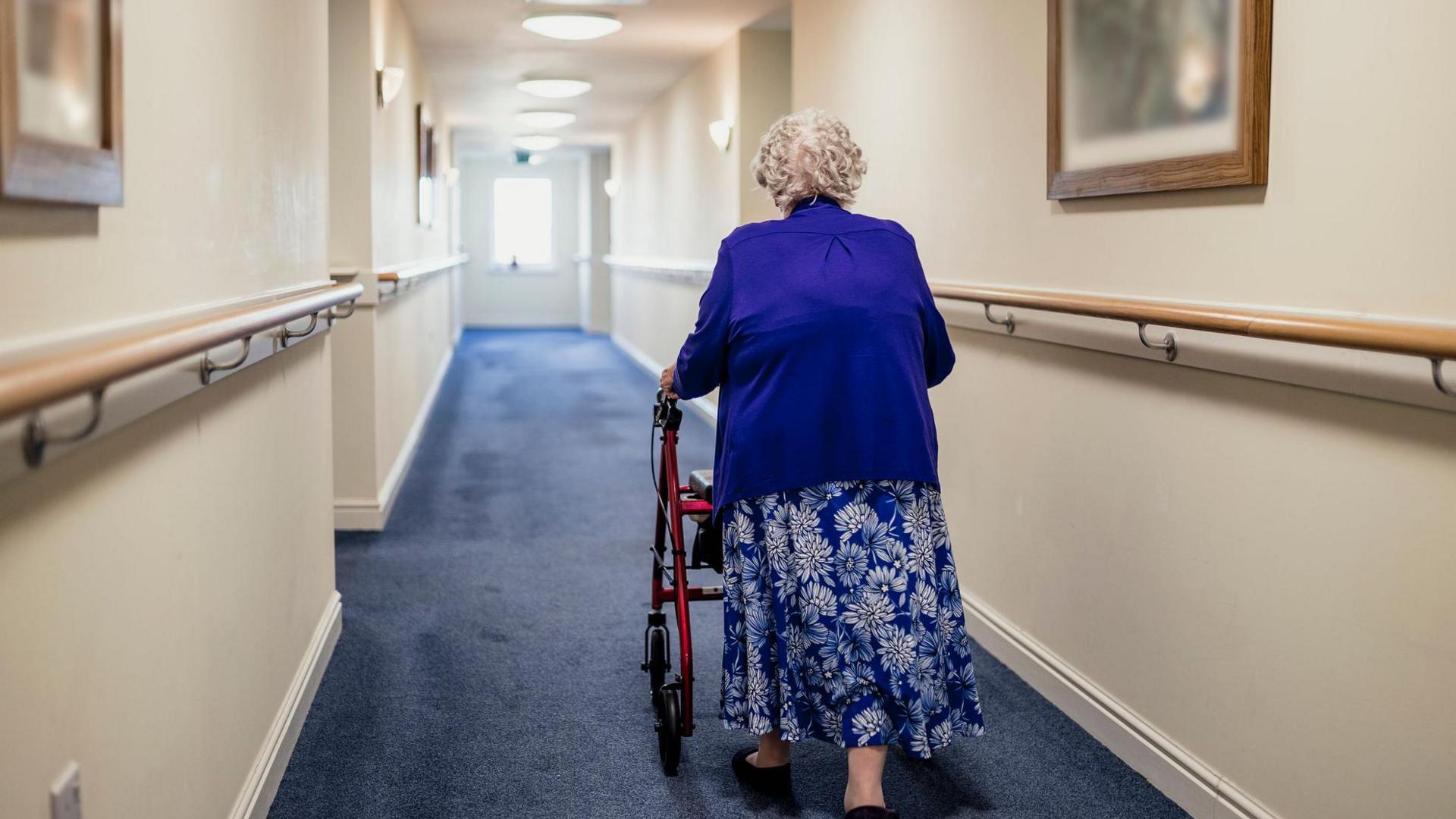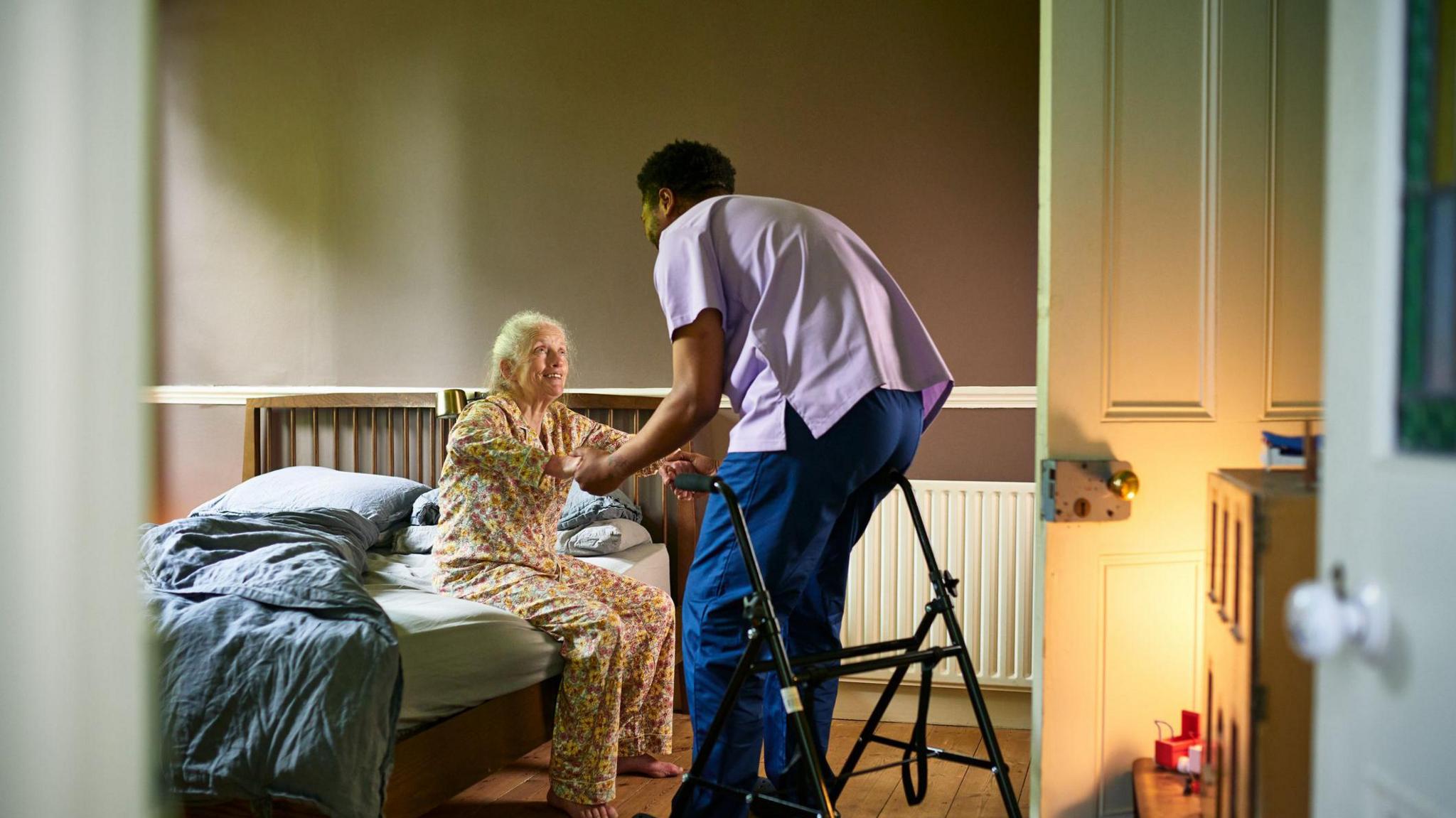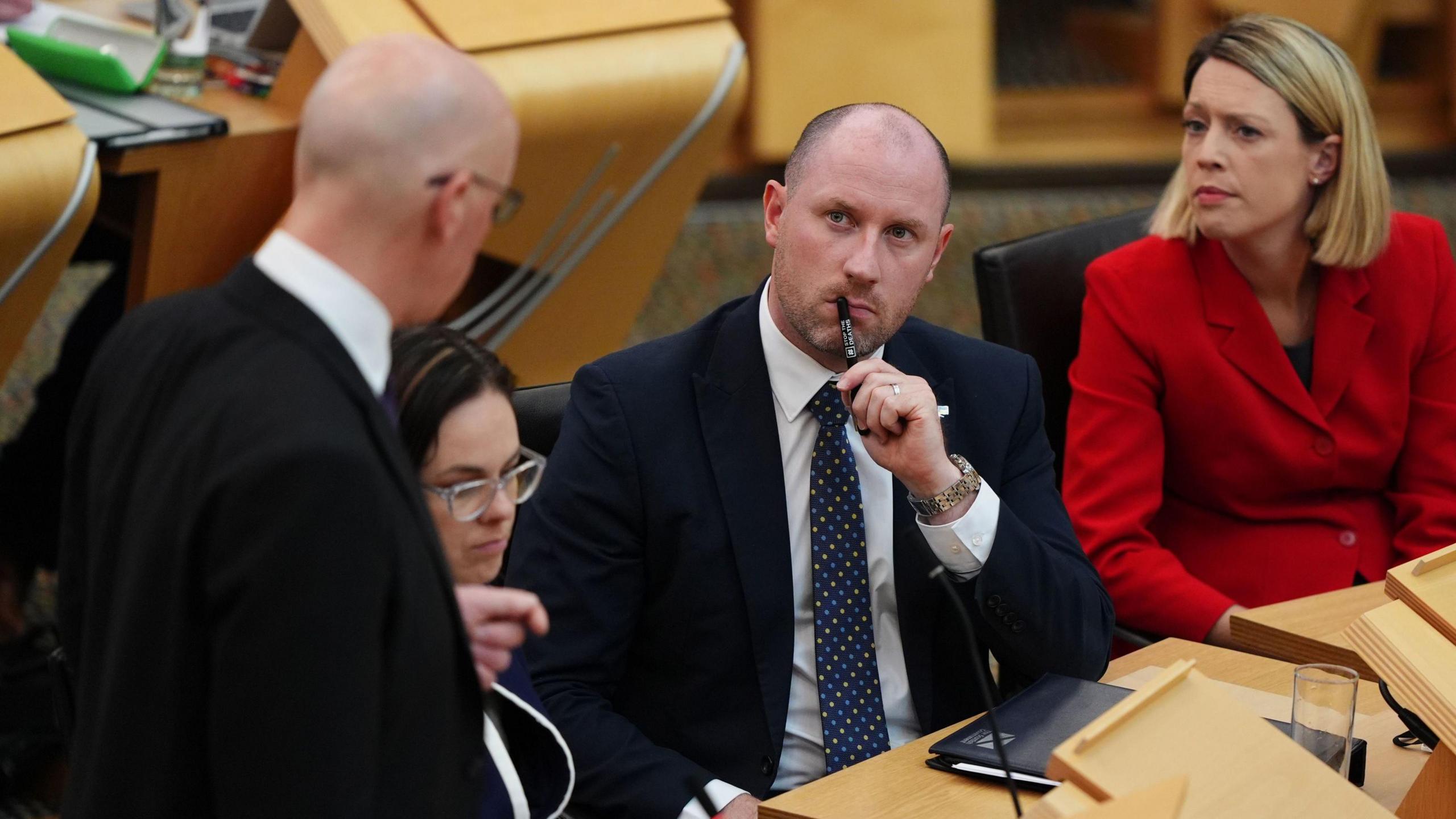Can Scotland's National Care Service become a reality?

- Published
The National Care Service was announced by then-First Minister Nicola Sturgeon in 2021 as the most ambitious reform of the devolution era.
But since then it has been repeatedly delayed and scaled back, amid rows over how it would work and how much it could cost.
Council leaders have now joined key unions in walking away from talks, and opposition parties are pressing for the plans to be binned.
With the government increasingly isolated, as well as short of financial and political capital, will the care service become a reality at all?
The original proposal for a National Care Service was inspired by the NHS; a network of care boards across Scotland, all part of a new agency which could ensure high standards.
Ministers said it would end the “postcode lottery” in care provision and “ensure consistently high-quality care”.
Those are undoubtedly laudable aims, which few have argued against. But the detail has always been an issue.

Widespread concerns over cost and governance saw ministers take the axe to those shiny plans, and the version now being considered by MSPs looks very different to the original vision.
Last year it was announced that care boards had been binned, and councils and NHS boards would instead retain responsibility for staff and services in a “shared accountability” model.
The Care Service itself would largely consist of a central board to manage that model.
This is a much cheaper proposal; it had been feared that set-up costs could run to £2.2bn over 10 years. The government now says it should be more like £345m over the same period.
The delivery date was also kicked three years further down the road, with the service to be introduced by 2028-29.
One problem with the rejigged plans is that legislation to set up the care service is already working its way through parliament.
Ministers now have to make massive amendments at “stage two” of the process - at a point when the SNP no longer has a majority to rely on.
New consultations had to be run on the revised proposals, and the responses, external have shown up the scale of the issues facing the government.
In fairness, they do underline the complex network of groups involved in caring, which the new service is meant to resolve.

Key partners include local councils, regional NHS boards, “integrated joint boards” and health and social care partnerships - which bring representatives of the first two together.
There are multiple boards and groups for all 32 council areas, and in some cases several of them submitted separate - sometimes contradictory - responses to this summer's consultation.
Councils have never truly loved the idea of a service which could eat into their responsibility for staffing and services, and their submissions were at best non-committal, at worst openly hostile.
That was a prelude to last week’s vote by council leaders - by a margin of 18 to 14 - to walk away from negotiations.
That puts them alongside unions like Unison and the GMB - which represent many care staff - that have also come out against the plans.
GMB Scotland has said the proposal “won’t deliver real change”, while Unison said that “even at this stage the government is still unable to explain what it intends to do, how it will work, or how it will improve things”.
The position of councils and even unions can perhaps be seen through a political lens. But what about those of health boards and other groups?
They encompass a pretty broad range of positions, and many groups say they like the idea of a new service to improve care provision - but overwhelmingly they say they want more detail.

A joint submission from NHS board chairs and chief executives said they were “increasingly concerned” that the government’s focus was on creating a “new structural entity” rather than “shifting the paradigm and strengthening the foundations of adult social care”.
NHS Tayside said it was not clear whether the changes “will achieve noticeable improvement of services”.
NHS Lothian said that in the current climate, “any available resources should be invested to improve frontline health and social care delivery”.
It is a common theme among responses, and one which has been echoed by opposition parties at Holyrood - why not just give the money directly to services instead?
Third sector groups which welcomed the principle of a new system sound increasingly exhausted by the way the policy development has played out.
There are certainly still some strong supporters, but the most common consultation response from these groups is that they "partly support and partly oppose" the bill as it stands.
They have made lots of detailed suggestions across a range of measures included in the legislation, and while this "co-design" approach is welcomed by many, it involves a huge amount of work.

Social Work Scotland said it had given the plans a "cautious welcome" in 2021, but that the years of talks since had "sapped stakeholders' trust and energy", and that the resulting proposals "amount to little more than an expensive and disruptive restructure".
Care home provider HC-One stressed that it still supported the creation of a care service, and broadly welcomed the changes to legislation, but said "further detail is needed" on how providers would pay for the additional duties and responsibilities placed on them.
Even bodies which don’t directly work in social care have raised questions.
The Law Society of Scotland said it might be better to drop the current bill and start again from scratch, saying the rewriting currently going on could be “inconsistent with the creation of good law”.
The Chartered Institute of Public Finance and Accountability said “the bill as it stands risks making a complicated system more complex, leading to delays to budgetary and strategic settlements that will exacerbate existing challenges”.
All of this leaves the government looking increasingly isolated - as well as being strapped for cash and struggling to win votes in the Holyrood chamber.
First Minister John Swinney has reiterated his commitment to delivering the National Care Service.
But how?
The government says it is “hopeful” that councils could come back to the table to thrash out a deal. But it is not immediately clear why they would without some major change in position.

Health Secretary Neil Gray has suggested he could negotiate with individual councils
Health Secretary Neil Gray has suggested he could start talking to individual councils rather than working through their umbrella group, Cosla.
But that sort of patchwork approach would, by definition, not create the level playing field the care service is meant to provide.
And it ignores the fact that even SNP-led councils have serious concerns.
In the consultation, Glasgow City Council said the “main thrust” of the current proposal was for structural change, and that there was “no evidential basis that this will achieve any improved outcomes for those who rely on care and support services”.
The council was “strongly opposed” to plans for a care service board and the strategy drafted by ministers.
Another SNP council, in Dundee, said it was “undecided” - stating that “more details are still needed about the cost and benefits”.
And that was still about the most positive response going.
Given how important councils, health boards and union staff are in delivering care on the ground, it’s all but impossible to imagine how the proposed system could work without them on board.
And the concerns voiced by a wide range of groups are not a narrow, quick-fix kind of problem - particularly for a government in the grip of a budget crunch, with 18 months to run until the next election.
Most people agree that improving standards in care would be a good thing, and that a care service could, in principle, be a good thing.
But there is an awful lot of work to be done, and many bridges to be built, if the current proposal is ever to get off the ground.